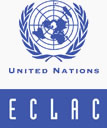Government officials from throughout Latin America and the Caribbean (LAC) and international experts gathered at a seminar to discuss policy measures, including tax reforms, that promote climate change mitigation and adaptation while supporting development and social cohesion.
 30 May 2014: Government officials from throughout Latin America and the Caribbean (LAC) and international experts gathered at a seminar to discuss policy measures, including tax reforms, that promote climate change mitigation and adaptation while supporting development and social cohesion.
30 May 2014: Government officials from throughout Latin America and the Caribbean (LAC) and international experts gathered at a seminar to discuss policy measures, including tax reforms, that promote climate change mitigation and adaptation while supporting development and social cohesion.
The seminar, titled ‘Public Policies in the Face of Climate Change: Pro-development Measures, Environmental Tax Reforms and Progress on Universal Social Protection in Latin America,’ was targeted at the focal points of Euroclima, the European Union (EU)-Latin America cooperation programme on climate change, as well as other decision-makers and experts from the region.
Ecuador’s Environment Minister, Lorena Tapia Nuñez, opened the meeting, commending Euroclima for providing reflection space for policy makers and other actors to exchange ideas and discuss climate change mitigation and adaptation policy options. She highlighted the threats posed by climate change to her country and various actions undertaken by the Ecuadorian Government, including an environmental tax on vehicle pollution and a standing dialogue with civil society on climate change. Joseluis Samaniego, UN Economic Commission for Latin America and the Caribbean (ECLAC), stressed ECLAC activities, in the Euroclima context and a related programme supported by German International Cooperation (GIZ), to help countries identify policies that balance development promotion, climate change adaptation and lower carbon footprints for economic activities.
During the seminar, panels discussed: linkages between climate change and fiscal, social and environment policies; the importance of integrating climate change considerations into national development models; challenges and potential for implementing environmental fiscal reforms; identification and implementation of climate-related economic and social policies; and needs for strengthening technical and policy making capacities related to climate change. Participants also described examples of mitigation and adaptation strategies in Ecuador, Guatemala and Mexico.
Working groups convened to examine the draft workplan designed by ECLAC for the second phase of Euroclima, and discuss participating countries’ priorities for mitigation and adaptation in specific sectors. Euroclima also presented a study on mitigation and adaptation policies that generate co-benefits, which featured cases of positive impacts for public health, biodiversity conservation and employment generation from policies adopted.
ECLAC and Ecuador’s Environment Ministry (MAE) and Secretariat of Higher Education, Science, Technology and Innovation (SENESCYT) organized the seminar, with support from GIZ and Euroclima. The seminar took place from 29-30 May 2014, in Quito, Ecuador. [ECLAC Press Release] [MAE Release] [Euroclima website]